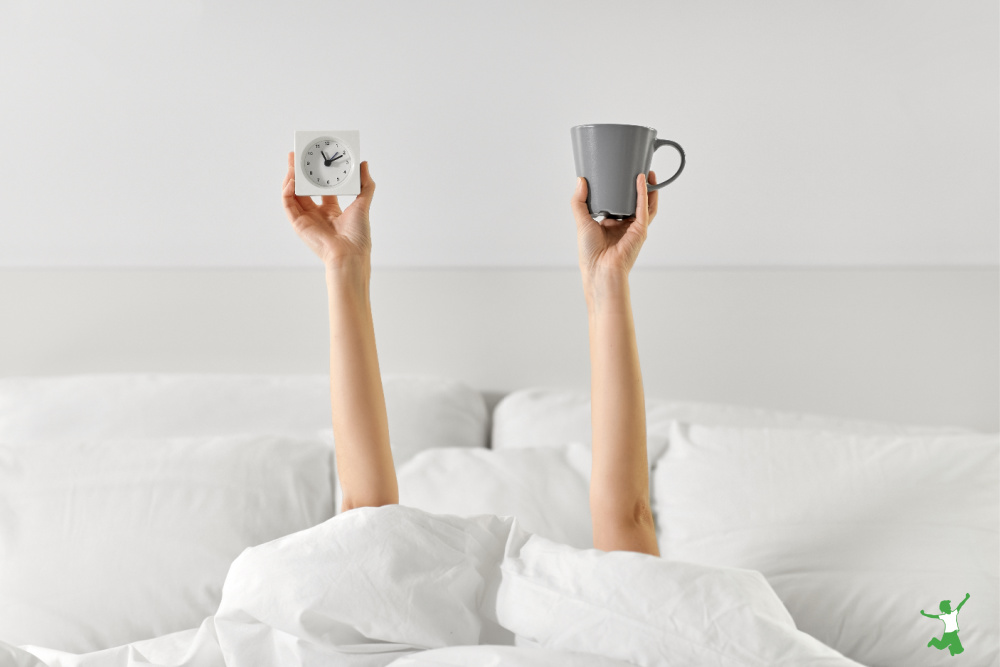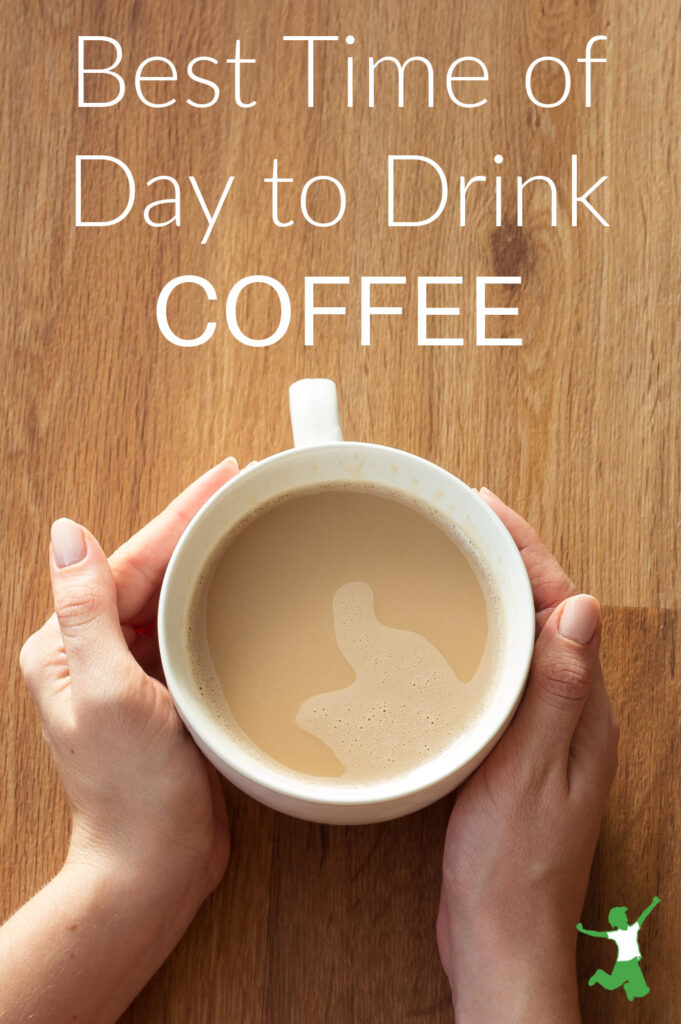Table of Contents[Hide][Show]
The best time in the morning to drink coffee to encourage the production of serotonin and maintain a balanced mood all day long.

I spent the entire first day at the International Wise Traditions Conference one year camped out in the room where Julia Ross was speaking.
Julia Ross is the acclaimed author of the books The Mood Cure and The Diet Cure.
It was my first opportunity to hear her speak, and I was not disappointed.
I took boatloads of notes that day and have enough material for several blog posts which I will write up in the coming weeks.
Today, however, I want to specifically address Julia’s discussion about coffee.
Julia Ross’ take on coffee is different from other speakers I have listened to before.
I wanted to share her warning about it because I think it’s something most coffee drinkers have no idea about.
Julia says that her main objection is that people drink coffee first thing in the morning when they get up. This typically results in skipping breakfast altogether because coffee is a strong appetite suppressant.
Not to mention that coffee reduces (not increases as popularly believed) blood flow to the brain by about 25%.
Worst Time for Coffee is First Thing in the Morning
Skipping breakfast is a big no-no and not just because it increases your chances of overeating especially starches and sugars later in the day.
Skipping your morning meal does a number on your body’s ability to produce the neurotransmitter serotonin which is derived from the amino acid tryptophan.
Tryptophan, like all the amino acids, is contained in protein.
Meat is the best source of tryptophan but only from animals roaming on pasture (corn contains almost NO tryptophan so don’t eat beef from corn fed cattle or eggs from primarily corn/soy fed chickens).
Protein (food) —–> Tryptophan (amino acid) —–> Serotonin (neurotransmitter) —–> Melatonin (hormone for restful sleep)
Serotonin is what helps you feel happy, calm, and self-confident even in the face of stress
. Moreover, ample serotonin is important for a restful night’s sleep as the body converts serotonin into melatonin at dusk. Inadequate melatonin results in insomnia problems.
Skipping breakfast in the morning short circuits the body’s ability to produce adequate serotonin throughout the day.
While eating protein later in the day definitely helps, your body still ends up playing serotonin catch up all day every day due to missing breakfast.
Julia says that we all need about 20-30 grams of protein 3X per day to fulfill our body’s requirement for amino acids in order to produce adequate neurotransmitters like serotonin.
If you are already deficient in serotonin, supplementation may be required for a short time to regain neurological balance.
This topic of neurotransmitters tends to get rather complicated, but the bottom line is this:
If you must drink coffee, then at the very least, wait until after breakfast to do it!
This way, the impact on your serotonin levels will not be as severe as drinking coffee first thing in the morning and skipping breakfast due to the appetite-suppressing effects.
You may find that this one simple change alone will help balance emotions the rest of the day.
Feelings of happiness, emotional flexibility, and stress reduction are common once this simple change is made.
How to Replenish Serotonin
Do you suspect that your serotonin levels are in the tank and you need neurotransmitter supplementation?
Clues would be that you grapple with worry, anxiety, OCD thoughts or actions, depression, panic attacks, and/or chronic insomnia.
In that situation, Julia Ross recommends this dosage with the amino acid tryptophan:
- 5-HTP (suggested source): 50 mg in the mid-afternoon and before bedtime.
- L-tryptophan (suggested source): 500 mg in the mid-afternoon and again before bed especially if insomnia is a problem.
Note that 5-HTP is cheaper than L-tryptophan but some people get nausea from it, so switch to L-tryptophan if 5-HTP doesn’t work for you.
For children, start with a fraction of the dose above and only use L-tryptophan.
Raise the dosage as needed to eliminate low serotonin symptoms.
Next Steps
Once you’ve put off AM coffee until after you eat, you might perhaps feel motivated to try to shake the habit completely.
According to Julia Ross, people who crave chocolate, coffee, alcohol, and even exercise are typically low in the neurotransmitter endorphin.
Using supplementation of amino acids that are precursors to endorphin may help in trying to shake the coffee habit completely. These include:
- Amino acid d-phenylalanine (DPA) (suggested source): 500 mg, 2-4X/day. Use DPA if you are a daily coffee drinker and also an anxious person.
- Amino acid d-phenylalanine (DPA) bound to the amino acid I-phenylalanine (LPA) – known in combination as DLPA (suggested source): 500 mg, 2-3X/day. Use DLPA if you crave the energizing effects of coffee and are not typically an anxious person.
Do you think a deficiency of neurotransmitters might be the reason some folks love their coffee so much?
Are you game to try changing when you drink AM coffee to help balance brain chemistry? Or, does it make more sense to switch to a noncaffeinated beverage like dandelion coffee instead?
Please share your thoughts on this and personal experience in the comments!

More Information
The Truth About Your Morning Coffee Fix
How Bulletproof Coffee Shoots You in the Foot








Great article. I already know of a few people that could benefit from this info. Thanks.
I tend to water down my coffee with raw milk. I’ve tested it with drinking that first thing in the morning vs after eating. I don’t get a major rush when there is just enough coffee for flavor unless there was more coffee than water when brewing. Still, I enjoy it more after breakfast. I did end up losing some much needed weight when I watered down coffee with raw milk which gave me that boost of energy to raw around with the kids and get things done. I then had breakfast and was good to go. Probably not the healthiest way to lose weight but it helped me a little more when I was at a stopping point of losing anymore weight before going to the gym.
I’d say people who lived through the Great Depression and two world wars understand stress. 😉
I think a better point would be, don’t skip breakfast, not coffee is terrible for you.
David, that’s excluded from the fact that your grandma lived in a other period of time.
Caffeine has a direct impact on your adrenal glands. It makes you adrenal glands release cortisol and adrenaline which gives you the ‘rush’. After a while your adrenal glands are exhausted and won’t give you any cortisol or adrenaline anymore.
Given the fact that cortisol and adrenaline also get released when your body or mind is under stressful conditions your adrenal glands get further depleted. Something which didn’t happen that much before. Nowadays stressful conditions are around every corner.
Exhausted adrenal glands together with imbalanced thyroid are one of the major factors people get sick.
So, it’s fine if you want to drink coffee and feel fine but when you think you are constantly tired or fatigued you better skip your coffee for a while.
Definitely NOT fear mongering. It’s information that works. I wish someone had posted this article years ago. I definitely think a deficiency of neurotransmitters is why most people drink coffee. I drank coffee, only 1-2 cups every morning for 20 years. It didn’t work for me anymore, didn’t feel awake, so I stopped. 3 days later I had a panic attack. Never happened before in my life. I didn’t make the correlation and picked up coffee again and quit again. Same thing happened, 2nd panic attack. And now I am suffering from anxiety. So I am on neurotransmitter therapy now and will never touch the stuff again!!! If only I knew what it was doing to me, I would’ve never drank it for that long.
good luck getting a coffee drinker to wait until after breakfast! the catch 22 is that it takes brain activity to prepare breakfast, and a coffee drinker literally has no brain activity til after the cup!
Great article! I saw the talk too. I definitely think a deficiency of neurotransmitters is why most people drink coffee. What I don’t remember is why. How does the coffee effect the neurotransmitters? I drank coffee 1-2 cups every morning for 20 years. It didn’t work for me anymore, didn’t feel awake, so I stopped. 3 days later I had a panic attack. Never happened before in my life. I didn’t make the correlation and picked up coffee again and quit again. Same thing happened, 2nd panic attack. And now I am suffering from anxiety. So I am on neurotransmitter therapy now and will never touch the stuff again!!! If only I knew what it was doing to me, I would’ve never drank it for that long.
Yes, I agree with you that imbalance of brain chemistry is the primary reason for coffee addiction. Fix the deficiency, then coffee is much easier to leave behind. Coffee messes with blood sugar and cascades into other hormonal problems. I can’t tell you how many women I know who drink coffee “just fine thank you” until menopause hits. Best to get off it before the silent hormonal problems crop up. A cup once in awhile at a party or after dinner at a restaurant is certainly no big deal but every day is not moderation even just one cup. If you think about it first thing in the morning when you get up and it is a primary motivator of your morning, that is a clear sign IMO of coffee addiction.
wow! i didn’t know that! thank you for letting us know.
I happen to really like coffee. Even though I have a cup when I first get up, then I get showered and dressed and have my breakfast. Usually I will have another cup when I get to work. I try not to drink any after that. I did stop drinking coffee at one time but did not notice really any difference and did I say I really like coffee. No cream, no sugar just black organic coffee.
There’s no doubt that some people can drink coffee without a problem. However, I think nowadays most folks are just addicted to it due to nutritional deficiency from bad diet.
Love this! Even though I love coffee this is very true. I used to not drink it at all and can only have half caff but have gone down to decaf. Although many fitness (different than wellness) magazine or books will go ahead and tell you to have your coffee and that its good for you, I have found I do not have the endurance or stamina I have when I’m off it. The only energy you get from it are quick bursts that make you feel drained and needing more in hours. My energy feels endless when I am off all caffeine!